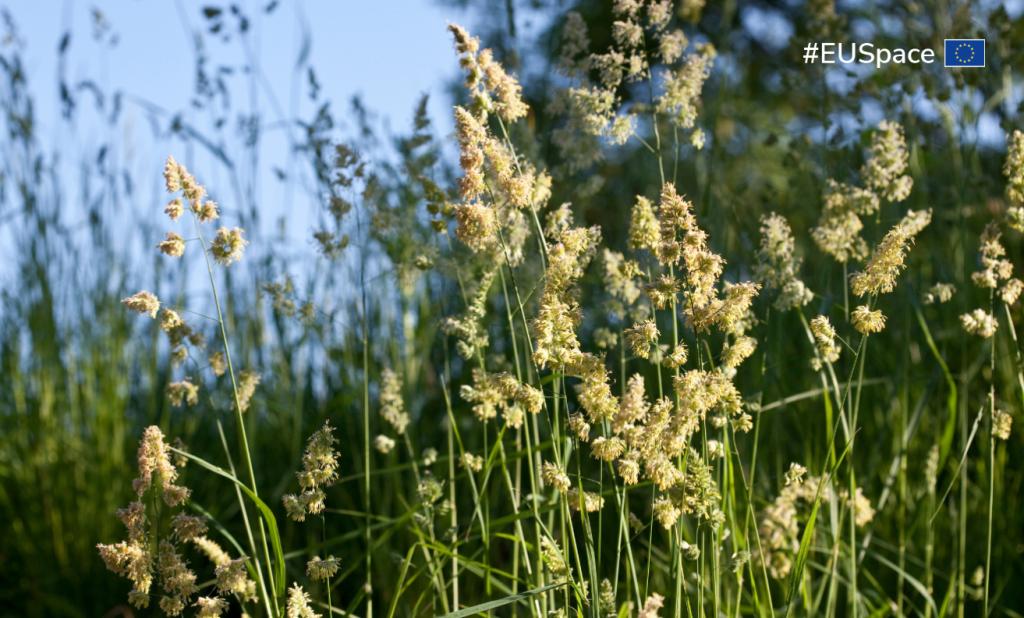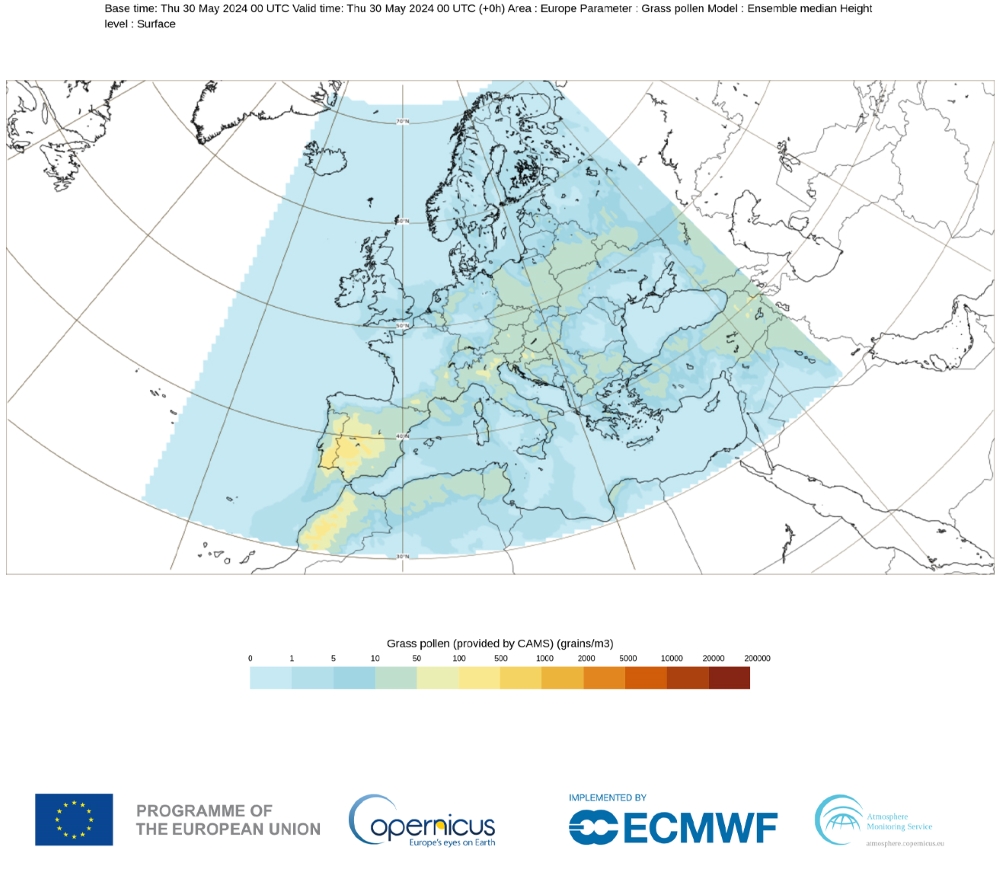Copernicus fuels healthtech innovation

Copernicus, through its Atmosphere Monitoring Service (CAMS), provides fundamental pollen information worldwide. The Copernicus demonstrator in healthcare, led by Czech Republic-based IQVIA, will harness this data to better understand the healthcare system and pinpoint environmental factors leading to certain health events.
Pollen allergy is a significant concern impacting a substantial portion of the European population
Over the past few decades, Europe has witnessed a notable rise in pollen-induced allergies. Pollen allergies can manifest in various degrees of severity, often leading to conditions such as asthma. The impact is particularly noticeable during the pollen flight seasons, predominantly in spring and summer. Individuals with both chronic and occasional asthma may encounter health challenges during these periods, underscoring the broad spectrum of effects that pollen allergies can have on respiratory health.
As temperatures rise and weather patterns undergo alterations, climate change is projected to increase the concentration of airborne pollen leading to a higher incidence of allergic reactions and exacerbating respiratory conditions among Europeans.
The duration of pollen seasons is increasing by approximately 0.9 days annually, and there has been a rise in the amount of pollen in the atmosphere compared to two decades ago (Ziska et al., 20191). With climate change prolonging and intensifying pollen seasons, prediction and warning systems are increasing in importance. Monitoring and understanding these shifts in allergen dynamics are crucial for both public health initiatives and individual well-being, as they enable informed strategies to mitigate the adverse effects of higher pollen concentrations in the air.
Copernicus is contributing to the battle against pollen allergies
Through the Copernicus Atmosphere Monitoring Service (CAMS) regional ensemble system, updated daily, the EU Earth observation system offers hourly details on key allergen pollen species, including alder, birch, olive, grass, mugwort, and ragweed. Additionally, within the same dataset, it furnishes information on other pollutants, such as ozone or nitrogen dioxide, which, when combined with elevated pollen concentrations, can exacerbate respiratory symptoms.
Copernicus has been proven essential in aiding the battle against pollen allergies. Copernicus pollen products offer valuable insights into the dynamics of airborne pollen, helping to predict and analyse the seasonal variations and geographical distribution of allergenic particles. Its wealth of information regarding pollen concentrations from the past, present and future becomes a valuable asset for various stakeholders in both the public and private domain, offering increasingly efficient solutions. By offering accurate and timely information, Copernicus pollen products empower allergy sufferers to better manage their conditions, healthcare professionals to implement proactive treatment strategies, and researchers to enhance their understanding of the intricate relationship between climate, vegetation, and airborne allergens.
The Copernicus demonstrator has been enabling the use of space data in healthcare
Chosen by the European Union Agency for the Space Programme (EUSPA) to lead this demonstrator, IQVIA stands at the forefront of innovation in the healthcare sector, demonstrating capabilities in harnessing data to develop innovative healthcare solutions. IQVIA has analysed pollen concentrations, uncovering significant correlations between sales of allergy medications and pollen levels in the Czech Republic.
In the study, a parallel progression in both sets of maps below suggests a strong correlation between pollen concentration and sales of anti-allergy drugs. As the pollen levels increase, it is noticeable a higher purchase of anti-allergy drugs, likely to combat the symptoms caused by the higher pollen levels.

Within the research, IQVIA sell-out data is used to analyze sales trends for different types of allergy medication, including WHO ATC2 R06 Antihistamines, WHO ATC5 V01AA02 Grass pollen, and WHO ATC5 V01AA05 Trees. The calculation of sales in each pharmacy was based on a moving average of seven days. The pharmacy-level sales data were used as reported directly from pharmacies to IQVIA, excluding internet pharmacies.
The identified correlation between pollen concentration and anti-allergy drug sales unveils diverse possibilities for stakeholders across industries. Pharmaceutical companies can better analyse demand for anti-allergy drugs and improve demand forecasts. This empowers them to optimize production processes, fine-tune distribution channels, and customize marketing strategies, particularly targeting regions with heightened pollen levels. Healthcare providers and policymakers can leverage this correlation for resource planning, ensuring ample stocks of anti-allergy medications in areas prone to elevated pollen during peak seasons. Additionally, the health tech industry can develop apps and solutions offering real-time pollen level updates and preventive measures. For patients, the integration of this data into healthcare may enable personalized strategies. By associating pollen levels with symptom severity, individuals can manage their conditions more effectively, ultimately enhancing their quality of life.
“The wish for citizens to embrace a healthier way of life is making the EU Space programme components such as Copernicus or Galileo more important than ever. The prospective on the increase of the health applications is therefore major,” declared Gerda Kuum, Healthcare Segment Leader at EUSPA.
“At IQVIA, we believe in the transformative power of data. Our work with the Copernicus demonstrator has illustrated how space data can be harnessed to create innovative solutions in healthcare. By analyzing pollen concentrations, we’ve uncovered significant correlations that have far-reaching implications for various stakeholders in the healthcare industry. This demonstrates our dedication to accelerating innovation for a healthier world,” said Luka Chichov, General Manager, Czech Republic, IQVIA.
By leveraging Copernicus' information, IQVIA enhances its ability to gather valuable data and insights into various aspects of healthcare, including the relationship between global environmental data and human health. The integration of such information allows for a more comprehensive understanding of healthcare and its trends as well as current and forecasted environmental conditions, enabling IQVIA to design and implement tailored solutions that address specific needs within the healthcare industry. Whether it's optimizing healthcare delivery, improving patient outcomes, or enhancing overall healthcare management, IQVIA's utilization of Copernicus highlights how healthcare can benefit from pioneering applications.
1Ziska, L.H., et al., 2019, 'Temperature-related changes in airborne allergenic pollen abundance and seasonality across the northern hemisphere: a retrospective data analysis’, The Lancet Planetary Health, 3(3), pp. e124–e131. https://doi.org/10.1016/S2542-5196(19)30015-4
Media note: This feature can be republished without charge provided the European Union Agency for the Space Programme (EUSPA) is acknowledged as the source at the top or the bottom of the story. You must request permission before you use any of the photographs on the site. If you republish, we would be grateful if you could link back to the EUSPA website (http://www.euspa.europa.eu).